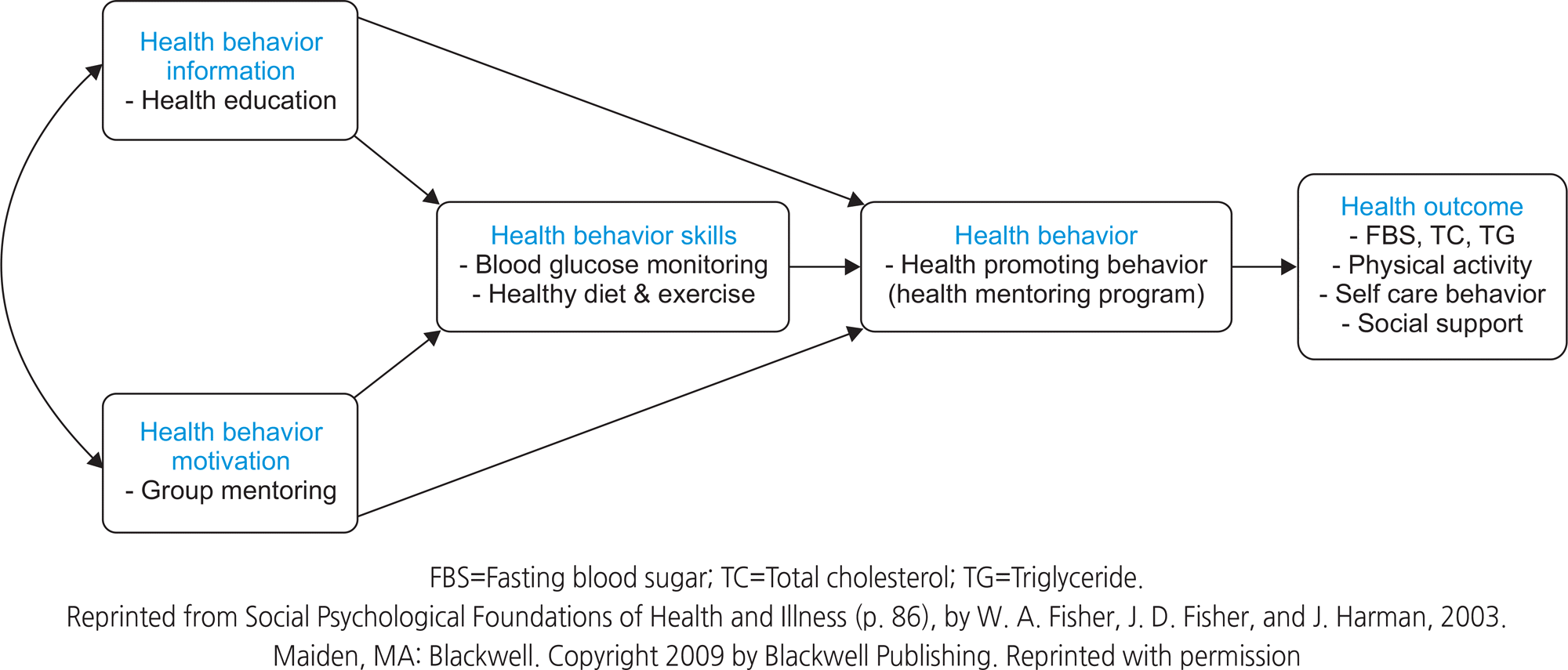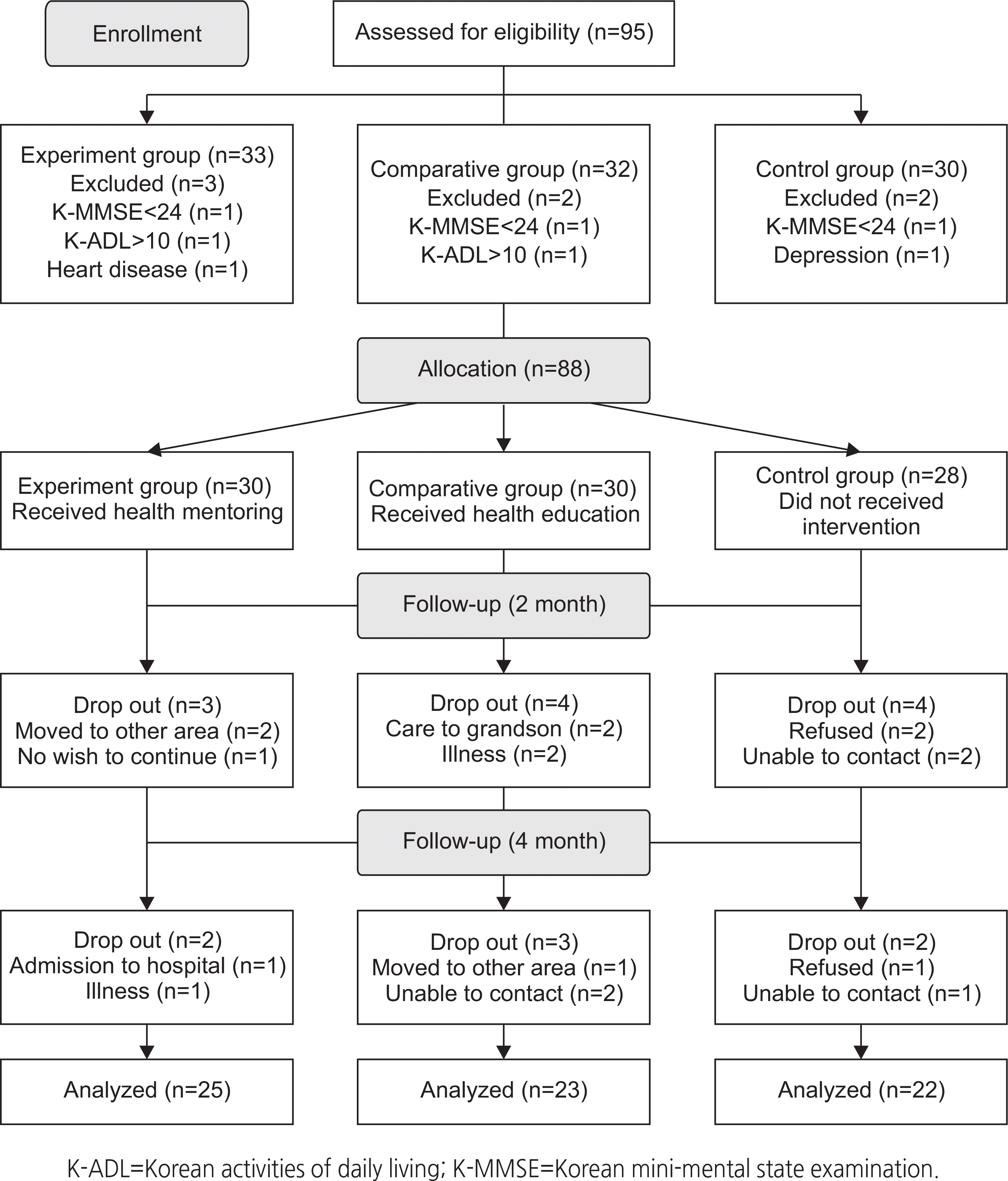Abstract
Purpose
This study aimed to estimate the effects of a health mentoring program on fasting blood sugar, total cholesterol, triglyceride, physical activity, self care behavior and social support changes among community-dwelling vulnerable elderly individuals with diabetes.
Methods
A non-equivalent control group pre-post-test design was used. Participants were 70 community-dwelling vulnerable elderly individuals with diabetes. They were assigned to the experimental (n=30) or comparative (n=30) or control group (n=28). The experimental group participated in the health mentoring program, while the comparative group participated in health education program, the control group did not participate in any program. Data analyses involved a chi-square test, Fisher's exact test, a generalized linear model, and the Bonferroni correction, using SPSS 23.0.
Results
Compared to the control group, the experimental and comparative groups showed a significant decrease in fasting blood sugar, total cholesterol, and triglyceride. Compared to the comparative and control groups, the experimental group showed significant improvement in self care behavior. However, there were no statistical differences in physical activity or social support among the three groups.
Go to : 
References
1. Ministry of Health and Welfare. Elderly person survey 2014 [Internet]. Seoul: Korea Institute of Health and Social Affairs;c2015. [cited 2016 Nov 20]. Available from:. http://www.mohw.go.kr/react/gm/sgm0601vw.jsp?PAR_MENU_ID=13&MENU_ID=1304020701&CONT_SEQ=293292&page=1.
2. Lee TW, Ko IS, Lee KJ, Kang KH. Health status, health perception, and health promotion behaviors of low-income community dwelling elderly. Journal of Korean Academy of Nursing. 2005; 35(2):252–261.

3. Kang JH, Kim JA, Oh KS, Oh KO, Lee SO, Lee SJ, et al. Health status, depression and social support of elderly beneficiaries of the national basic livelihood security system. The Journal of Korean Academic Society of Adult Nursing. 2008; 20(6):866–882.
4. Korean Diabetes Association. Diabetes fact sheet in Korea 2016 [Internet]. Seoul: Korean Diabetes Association;c2017. [cited 2017 Jul 1]. Available from:. http://www.diabetes.or.kr/pro/news/admin.php?category=A&code=admin&number=1428&-mode=view.
5. Choi GA, Jang SM, Nam HW. Current status of self-management and barriers in elderly diabetic patient. Korean Diabetes Journal. 2008; 32(3):280–289. https://doi.org/10.4093/kdj.2008.32.3.280.

6. Lim SC. Intervention strategies for older adults with diabetes. The Journal of Korean Diabetes. 2012; 13(1):52–55. https://doi.org/10.4093/jkd.2012.13.1.52.

7. Kim NH, Lee YJ, Kim HO, Oh CR, Park JR, Park SY, et al. Effects of comprehensive support on glycemic control using community networks in low-income elderly patients with diabetes. Korean Diabetes Journal. 2008; 32(5):453–461. https://doi.org/10.4093/kdj.2008.32.5.453.

8. Kang HY, Gu MO. Development and effects of a motivational interviewing self-management program for elderly patients with diabetes mellitus. Journal of Korean Academy of Nursing. 2015; 45(4):533–543. https://doi.org/10.4040/jkan.2015.45.4.533.

9. Sung KW, Lee JH. The effects of regular walking exercise on metabolic syndrome, cardiovascular risk factors, and depressive symptoms in the elderly with diabetic mellitus. Journal of Korean Academy of Community Health Nursing. 2010; 21(4):409–418. https://doi.org/10.12799/jkachn.2010.21.4.409.

10. De Greef K, Deforche B, Tudor-Locke C, De Bourdeaudhuij I. Increasing physical activity in Belgian type 2 diabetes patients: A three-arm randomized controlled trial. International Journal of Behavioral Medicine. 2011; 18(3):188–198. https://doi.org/10.1007/s12529-010-9124-7.

11. Dickens AP, Richards SH, Hawton A, Taylor RS, Greaves CJ, Green C, et al. An evaluation of the effectiveness of a community mentoring service for socially isolated older people: A controlled trial. BMC Public Health. 2011; 11:218. https://doi.org/10.1186/1471-2458-11-218.

12. Coull AJ, Taylor VH, Elton R, Murdoch PS, Hargreaves AD. A randomised controlled trial of senior lay health mentoring in older people with ischemic heart disease: The braveheart project. Age and Ageing. 2004; 33(4):348–354. https://doi.org/10.1093/ageing/afh098.
13. Gu MO, Eun Y, Kim ES, Ahn HR, Kwon IS, Oh HS, et al. Effects of an elder health promotion program using the strategy of elder health leader training in senior citizen halls. Journal of Korean Academy of Nursing. 2012; 42(1):125–135. https://doi.org/10.4040/jkan.2012.42.1.125.

14. Kim SH. Effects of a volunteer-run peer support program on health and satisfaction with social support of older adults living alone. Journal of Korean Academy of Nursing. 2012; 42(4):525–536. https://doi.org/10.4040/jkan.2012.42.4.525.

15. Park YS, Song JY, Hwang CJ. The effect of volunteer work commitment on psychological well-being for the profession retiree and retirement expectant men: Verification of the mediating effect of social resource and volunteer work activity. Journal of Welfare for the Aged. 2012; 56:33–59.
16. Chang SJ, Choi SY, Kim SA, Song MS. Intervention strategies based on information-motivation-behavioral skills model for health behavior change: A systematic review. Asian Nursing Research. 2014; 8(3):172–181. https://doi.org/10.1016/j.anr.2014.08.002.

17. Fisher WA, Fisher JD, Harman J. The information-motivation-behavioral skills model: A general social psychological approach to understanding and promoting health behavior. Suls J, Wallston KA, editors. Social Psychological Foundations of Health and Illness. Maiden, MA: Blackwell;2003. p. 82–106.

18. Osborn CY, Rivet Amico K, Fisher WA, Egede LE, Fisher JD. An information-motivation-behavioral skills analysis of diet and exercise behavior in Puerto Ricans with diabetes. Journal of Health Psychology. 2010; 15(8):1201–1213. https://doi.org/10.1177/1359105310364173.

19. Kim YJ, Seo NS, Kim SJ, Park IS, Kang SJ. Quality of life and its correlated factors among elderly people with diabetes in a community. The Korean Journal of Health Service Management. 2014; 8(1):75–86. https://doi.org/10.12811/kshsm.2014.8.1.075.

20. Jang SH, Kim CS, Kim MR. An effect the social support on the self-esteem and life satisfaction in elderly. Journal of Ease-West Nursing Research. 2008; 14(2):39–46.
21. Chin YR, So ES, Lee HY. A meta-analysis of Korean diabetes patient studies from 1977 to2008. Journal of Korean Public Health Nursing. 2011; 25(1):5–16.
22. Shin SY, Lee S, Park HI, Kim M, Kim Y. Evaluation of analytical performance of two point-of-care analyzers for lipid testing. Song JH, editor. Proceedings of the 54th Fall Conference of The Korean Society for Laboratory Medicine; 2013 Oct 24-25. Daegu: The Korean Society for Laboratory Medicine;c2013. p. S33.
23. Byun S, Han JW, Kim TH, Kim KW. Test-retest reliability and concurrent validity of a single tri-axial accelerometer-based gait analysis in older adults with normal cognition. Public Library of Science One. 2016; 11(7):e0158956. https://doi.org/10.1371/journal.pone.0158956.

24. Kim YO. A study of factors predicting self-care behavior in diabetics. Journal of Korean Academy of Nursing. 1998; 28(3):625–637. https://doi.org/10.4040/jkan.1998.28.3.625.

25. Sherbourne CD, Stewart AL. The MOS social support survey. Social Science and Medicine. 1991; 32(6):705–714. https://doi.org/10.1016/0277-9536(91)90150-B.

26. Lim MK, Shin YJ, Yoo WS, Yang BM, Kim MH. Social support and self-rated health status in a low income neighborhood of Seoul, Korea. Korean Journal of Preventive Medicine. 2003; 36(1):54–62.
27. Lee HK, Cho MK. A study of mentor competence scale development to measure effectiveness of group mentoring program: Focusing on the college student. Studies on Korean Youth. 2012; 19(12):61–87.
28. Bae JM, Park GH. An illustrated guide to medical statistics using SPSS. Seoul: Hannarae Publishing Co.;2012. p. 1–367.
Go to : 
 | Figure 2.Conceptual framework of the health mentoring program based on Information-motivation-behavioral skills (IMB) model. |
Table 1.
Health Mentoring Program
Table 2.
Homogeneity Test of General Characteristics and Outcome Variables in Pre-Test (N=70)
Table 3.
Comparison of Variables among 3 Groups Using Generalized Linear Model (N=70)
Comp.=Comparative group; Cont.=Control group; FBS=Fasting blood sugar; Exp.=Experimental group; G×T=Group×Time; METs=Metabolic equivalents; M±SD=Mean standard deviation; TC=Total cholesterol; TG=Triglyceride. a=Experimental group; b=Comparative group; c=Control group. 4 m=after 4 months of intervention.




 PDF
PDF ePub
ePub Citation
Citation Print
Print



 XML Download
XML Download